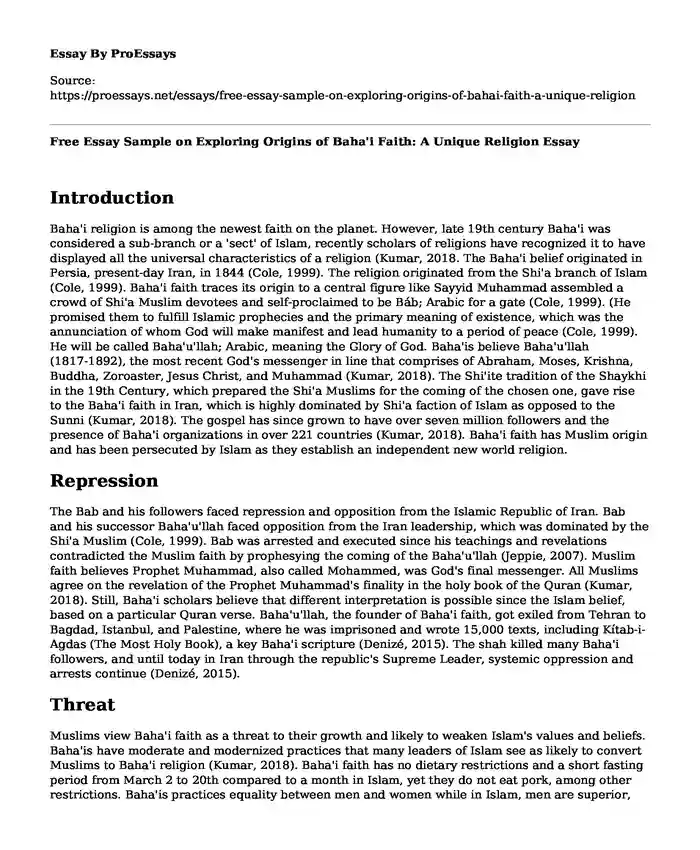Introduction
Baha'i religion is among the newest faith on the planet. However, late 19th century Baha'i was considered a sub-branch or a 'sect' of Islam, recently scholars of religions have recognized it to have displayed all the universal characteristics of a religion (Kumar, 2018. The Baha'i belief originated in Persia, present-day Iran, in 1844 (Cole, 1999). The religion originated from the Shi'a branch of Islam (Cole, 1999). Baha'i faith traces its origin to a central figure like Sayyid Muhammad assembled a crowd of Shi'a Muslim devotees and self-proclaimed to be Báb; Arabic for a gate (Cole, 1999). (He promised them to fulfill Islamic prophecies and the primary meaning of existence, which was the annunciation of whom God will make manifest and lead humanity to a period of peace (Cole, 1999). He will be called Baha'u'llah; Arabic, meaning the Glory of God. Baha'is believe Baha'u'llah (1817-1892), the most recent God's messenger in line that comprises of Abraham, Moses, Krishna, Buddha, Zoroaster, Jesus Christ, and Muhammad (Kumar, 2018). The Shi'ite tradition of the Shaykhi in the 19th Century, which prepared the Shi'a Muslims for the coming of the chosen one, gave rise to the Baha'i faith in Iran, which is highly dominated by Shi'a faction of Islam as opposed to the Sunni (Kumar, 2018). The gospel has since grown to have over seven million followers and the presence of Baha'i organizations in over 221 countries (Kumar, 2018). Baha'i faith has Muslim origin and has been persecuted by Islam as they establish an independent new world religion.
Repression
The Bab and his followers faced repression and opposition from the Islamic Republic of Iran. Bab and his successor Baha'u'llah faced opposition from the Iran leadership, which was dominated by the Shi'a Muslim (Cole, 1999). Bab was arrested and executed since his teachings and revelations contradicted the Muslim faith by prophesying the coming of the Baha'u'llah (Jeppie, 2007). Muslim faith believes Prophet Muhammad, also called Mohammed, was God's final messenger. All Muslims agree on the revelation of the Prophet Muhammad's finality in the holy book of the Quran (Kumar, 2018). Still, Baha'i scholars believe that different interpretation is possible since the Islam belief, based on a particular Quran verse. Baha'u'llah, the founder of Baha'i faith, got exiled from Tehran to Bagdad, Istanbul, and Palestine, where he was imprisoned and wrote 15,000 texts, including Kítab-i-Agdas (The Most Holy Book), a key Baha'i scripture (Denizé, 2015). The shah killed many Baha'i followers, and until today in Iran through the republic's Supreme Leader, systemic oppression and arrests continue (Denizé, 2015).
Threat
Muslims view Baha'i faith as a threat to their growth and likely to weaken Islam's values and beliefs. Baha'is have moderate and modernized practices that many leaders of Islam see as likely to convert Muslims to Baha'i religion (Kumar, 2018). Baha'i faith has no dietary restrictions and a short fasting period from March 2 to 20th compared to a month in Islam, yet they do not eat pork, among other restrictions. Baha'is practices equality between men and women while in Islam, men are superior, and in some Muslim countries, women are not allowed to school or even vote (Kumar, 2018). Until recently, women in the Islamic Kingdom of Saudi Arabia women were not allowed to drive. The dressing is modest by the Baha'is, unlike in Islam, where women wear hijabs and cover their face amidst high temperatures, such as in North Africa and the Middle East (Jeppie, 2007). Generally, many of Baha'i faith practices are more westernized and may be perceived by Islam as provocative.
Conclusion
In conclusion, Baha'is is the most recent faith, and there is a need for Islam to observe freedom of worship and respect other faiths. Baha'i faith originated from Shi'a Muslim; thus, there shared values and practices as well as differences. The differences might be perceived as Anti-Islam since Baha'i faith is recent and post-Islamic. Baha'is believe in one God and advocates for a peaceful world.
References
Cole, J. R. (1999). Religious Dissidence and Urban Leadership: Baha?is in Qajar Shiraz and Tehran. Iran, 37, 123. doi:10.2307/4299998
Denizé, D. (2015). Moving Forms of Dust. The Journal of Baha I Studies, 25(3), 80-80. doi:10.31581/jbs-25.3.11(2015)
Jeppie, S. (2007). Identity politics and public disputation: A Baha'i missionary as a Muslim modernist in South Africa. Journal for Islamic Studies, 27(1). doi:10.4314/jis.v27i1.39933
Kumar, M. (2018, April 24). Difference Between Islam and Bahai. Retrieved July 14, 2020, from http://www.differencebetween.net/miscellaneous/difference-between-islam-and-bahai/
Cite this page
Free Essay Sample on Exploring Origins of Baha'i Faith: A Unique Religion. (2023, Oct 04). Retrieved from https://proessays.net/essays/free-essay-sample-on-exploring-origins-of-bahai-faith-a-unique-religion
If you are the original author of this essay and no longer wish to have it published on the ProEssays website, please click below to request its removal:
- Paper Example on Importance of Learning How to Be a Follower
- Theology: Discussion on Theology of Miracles
- An Exposition of Foundationalism and Essentialism Essay
- Madinah and the Social Situation Before the Prophet Muhammad Essay
- Rizal's Retraction Essay Example
- Essay Example on Parker's Back: Flannel O'Connor's Tale of Spiritual Awakening
- Essay Sample on Spirit-Mind-Body: A Comprehensive Healing Model







